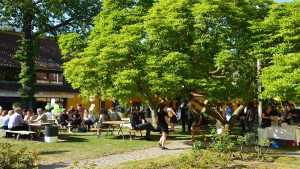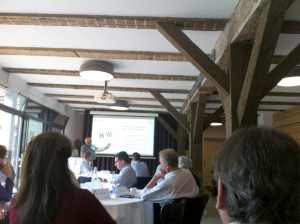News in 2016

|
Towards a new Urban Agenda – IFHP Summit 2016
2 June 2016, Copenhagen, Denmark

The beautiful garden of IFHP and Realdania in the middle of Copenhagen |

IFHP President Flemming Borreskov explaining the background of Habitat III |
FIG was invited to the International Federation of Housing and
Planning IFHP’s Council Summit 2016 on 2 June 2016. FIG and IFHP have a
Memorandum of Understanding. IFHP is a global network of people
passionate about making better cities addressing urban challenges and
opportunities, and providing new perspectives and ideas for the cities
of tomorrow.
Around 40 members of IFHP had found their way to a very warm Copenhagen,
and attended the Summit. IFHP has its office and meeting facilities in
the middle of old Copenhagen at Realdania, a member-based philanthropic
organization that supports projects in the built environment: cities,
buildings, and built heritage.
High on the agenda for the summit was preparatory work for Habitat III
that will take place in October 2016. IFHP President Flemming Borreskov
gave an introduction to Habitat III. The New Urban Agenda will be
adopted in Quito. In the original 8 millenium goals there was no word
about cities, however among the new 2030 goals that include 17 goals,
goad number 11 is about cities, and how to develop sustainable and
inclusive cities for all.
A number of key messages to IFHP materialized during the days:
- There is a divide between formal
and informal political and economic systems that directly effects the
ability of cities to develop in a sustainable manner.
- there is a need to acknowledge the
need for transparency and trust. We need to deal with corruption.
- Cities need to understand more
than what citizens want. Most citizens look for a reasonable job and
affordable home. What is important to the success of the individual is
far from what cities need to do to develop successful communities.
- We have to recognize that the long
term plans can only be achieved through adaptive and flexible approaches
and solutions that react to the increasing number of global shocks and
risks.
- Cities have to be constantly
redefined. The New Urban Agenda does not stop at the municipal boarder.
Louise Friis-Hansen
FIG Director
6 July 2016

























